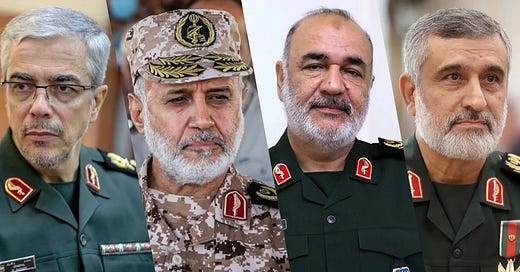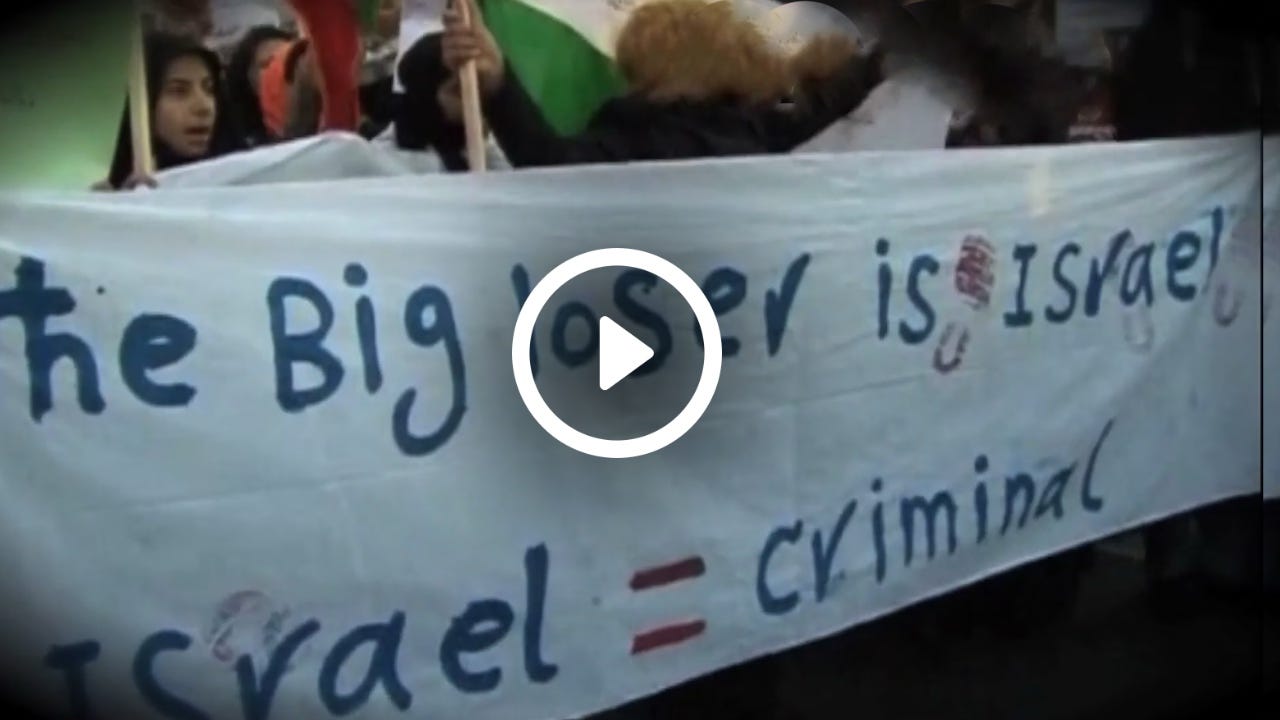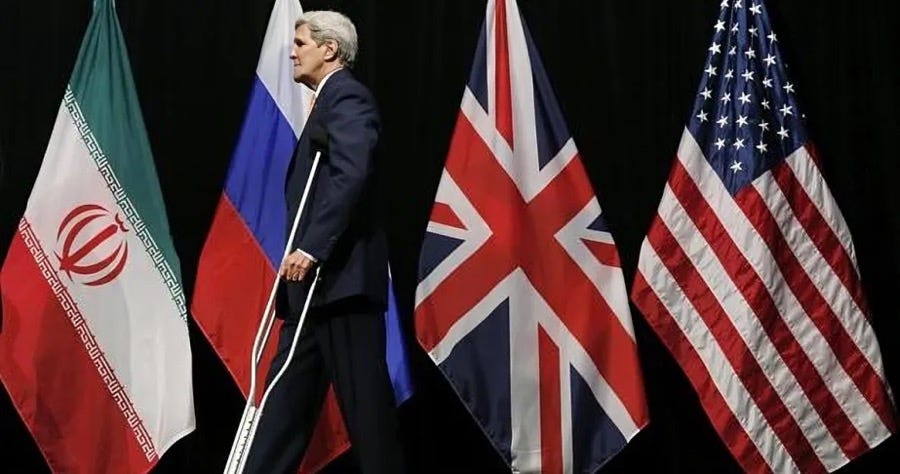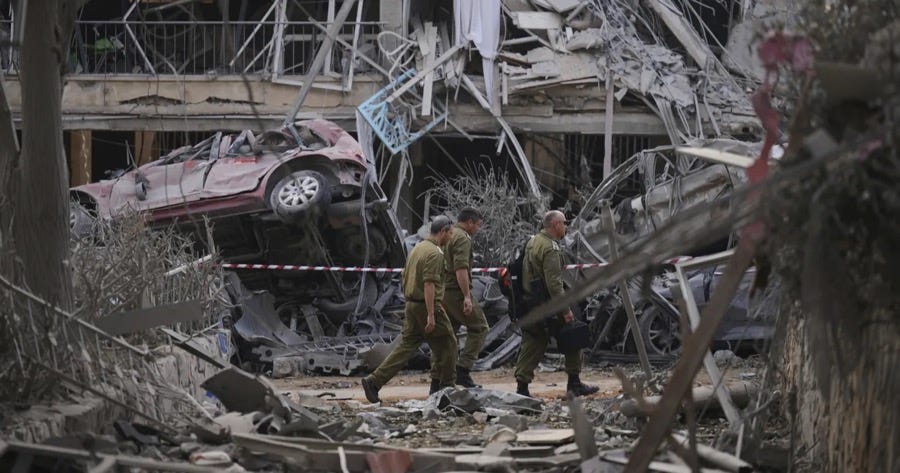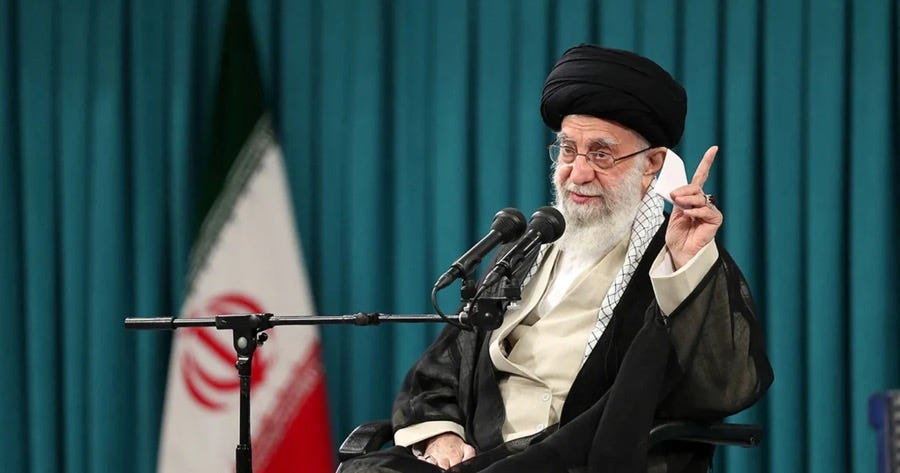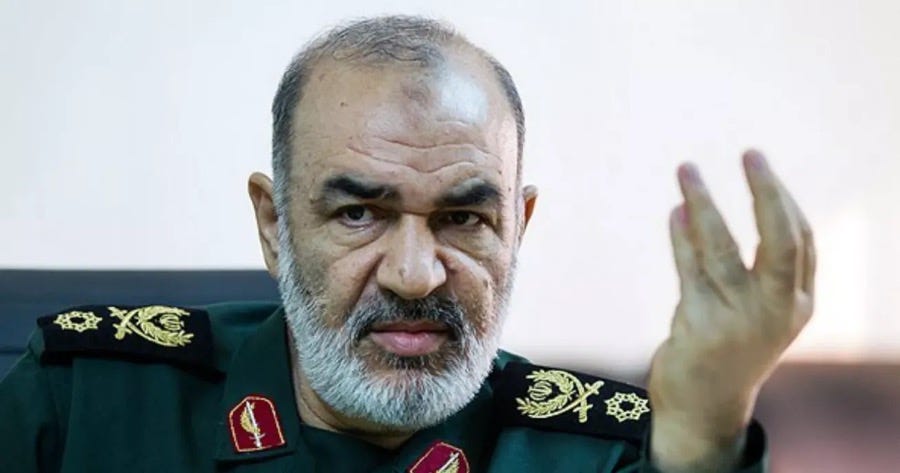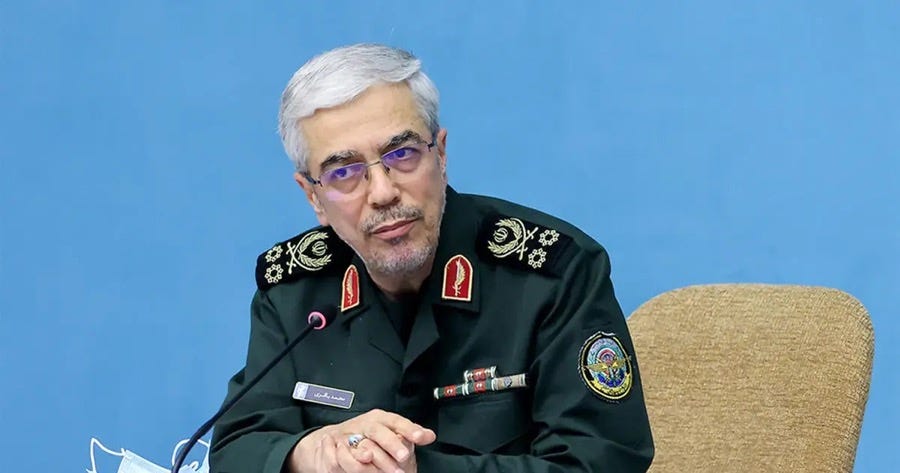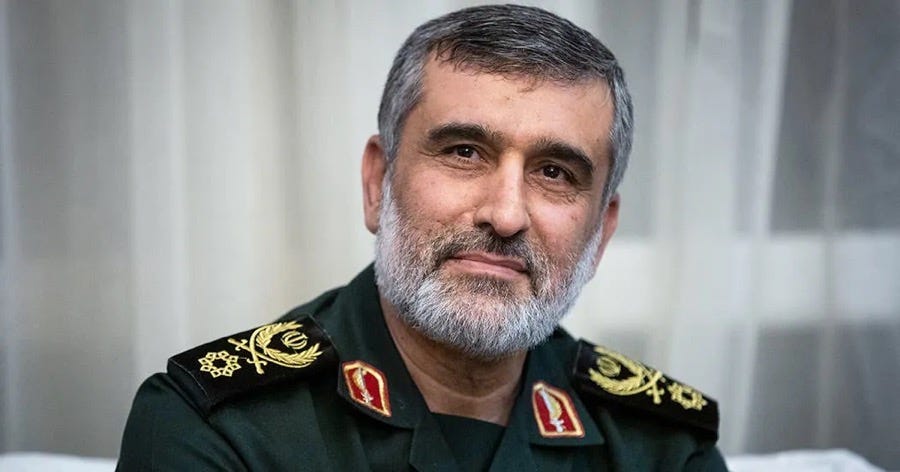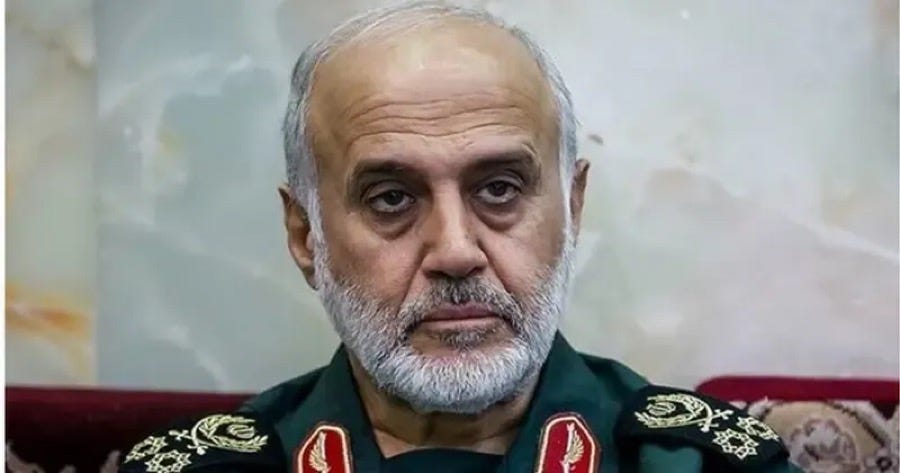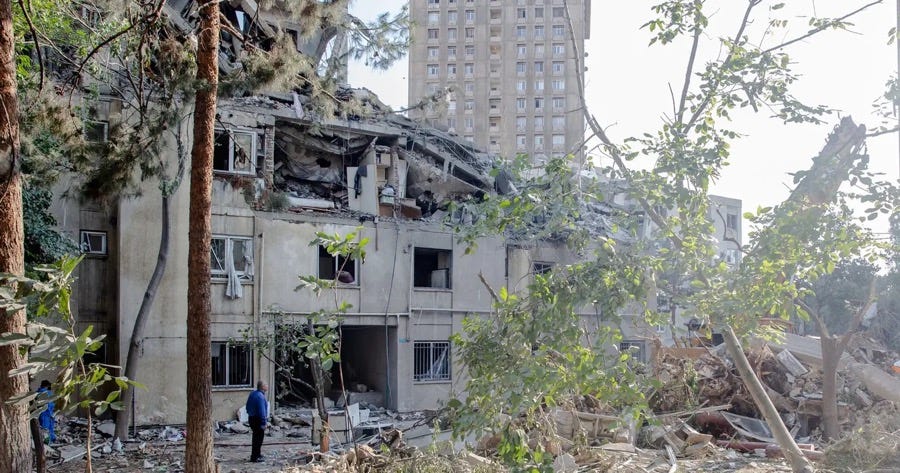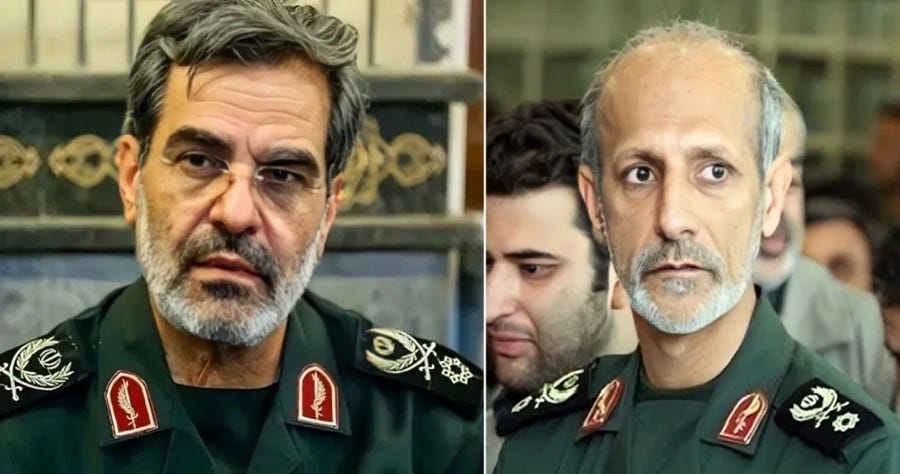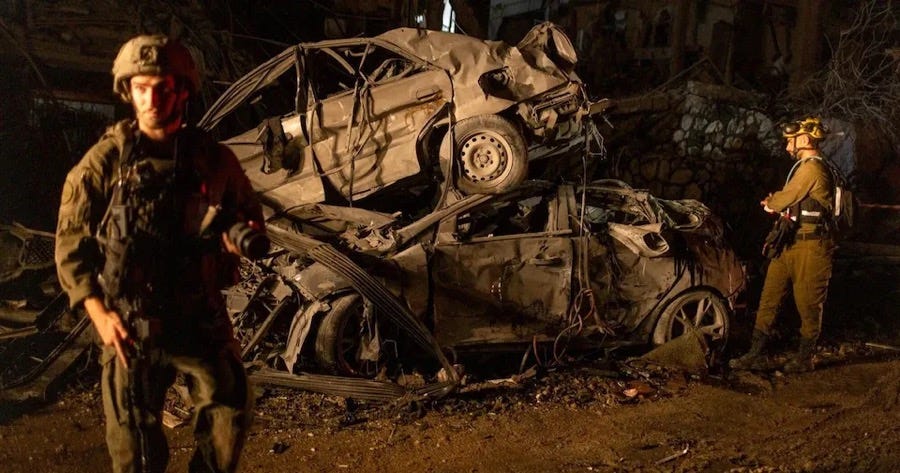In Trump They Must Trust + How Did Israel Manage to Attack Iran and Kill So Many Top Commanders?
Stay up to date with what’s really going on in Iran
4 TOP IRANIAN GENERALS KILLED IN ISRAELI STRIKES
Four of the Islamic Republic’s most senior military commanders were killed on Friday as Israel launched its largest-ever airstrike operation against Tehran.
Dear friends,
I just got off the phone with a former high-ranking Iranian diplomat and he has a message for you: No one in Iran knows what will happen next. “The priority of the Supreme Leader and the people around him is the survival of the regime,” says my diplomat friend, from Tehran. “How that can be achieved depends on so many factors and people with huge egos, mainly Donald Trump, Benjamin Netanyahu and the Supreme Leader, Mr. Khamenei.”
My friend told me that, like most Iranians right now, he had not slept for 36 hours and had only three or four minutes to talk. I asked him the one question on the top of everyone’s minds: How could the regime be so ineffective at defending its military commanders and military bases?
“Corruption,” was his one-word answer.
“Our government has been corrupted to the core. Israel has realized this and has been taking advantage of it for years. We all guessed, in the past, but we now know that Israel has agents in the highest offices of the country. My friends in the Revolutionary Guards and Intelligence Ministry [Iran’s two main intelligence organizations] tell me that even counter-espionage units are filled with Israeli agents. The type of operation that Israel carried out on Friday morning is the result of months or even years of preparation and intelligence gathering. It’s not something that they planned and carried out in a few days or weeks.”
“So, what will happen next?” I asked.
“The main priority right now is not defending the integrity of the system, or retaliation,” my friend said. “Military and intelligence officials need to find the hole in the system first and then make the next plans.”
My friend then sighed and said, “But corruption has turned our government into a sieve, so it’s very difficult to do anything about the holes.” He then hung up without saying goodbye.
Telling you that I’m worried for my family, relatives and loved ones in Iran is an understatement. Like my diplomat friend, I haven’t slept that much and have been working around the clock with my brilliant and dedicated friends and colleagues at IranWire to bring you the latest news.
We all have loved ones in Iran and we’ve been thinking about them. But like most Iranians, we are helpless. We feel that we have been taken hostage by a vicious regime willing to sacrifice its people for its own survival and its ambitions of becoming a nuclear power. We are also victims of an Israeli government that has no plan for the day after and thinks it can solve everything through brute force.
In a battle between Khamenei and Netanyahu, we have no good alternatives. The best we can do is hope that our loved ones don’t perish. I don’t have any answers and I’m not able to predict what may happen next. But after speaking with friends and contacts in Iran, I can offer some facts and observations that, hopefully, can give you a better understanding of the current situation.
The main culprit of these attacks is the Islamic Republic. Imagine you’re Israel, and a powerful government with oil resources and a strong military has been chanting “Death to Israel” for the past 46 years. Then that regime uses allies and proxies to kill your people. And then it secretly develops a nuclear bomb. What would you do if you were Israel? You must defend yourself. How is a different question: but Israel has the right to defend itself.
War is not the answer. I strongly believe that Iran and Israel are natural allies in the Middle East. As two non-Arab countries in a mostly Arab region, they have historic and cultural ties and have no actual strategic disputes. Most Iranians don’t see the Palestine issue as a priority; like many people around the world, Iranians sympathize with the plight of Palestinian people in the same way they sympathize with the Rohingya in Myanmar and the Uyghurs in China. But it’s not an issue for which they wish to sacrifice their lives. Israel’s war against Iran and the killing of innocent civilians like Parnia Abbasi, a young female poet who died in the attacks yesterday, will create a real animosity. A historic resentment could even turn Israel’s friends against it. Sustained Israeli attacks will further militarize Iran and destroy all the limited achievements of Iranian activists and civil society. If Prime Minister Netanyahu’s objective is regime change in Iran, he’s alienating and in many cases killing some people who could take part in creating a better future for Iran.
President Trump’s instinct is to solve the conflict through peaceful means. One of Trump’s main campaign promises was to bring an end to conflicts around the world. After these initial attacks and counterattacks, the two sides have an historic opportunity to work with the American president to resolve the conflict through diplomacy; it would both guarantee the survival of the regime at least for a few more years, and prevent the destruction of lives and infrastructure in Iran. I wish this regime could be replaced by a government led by a Nelson Mandela figure tomorrow. But that’s not in the cards. All I can wish for now is that the killing and mayhem stop. Also, Israel must realize that it has taught the regime a harsh lesson, and that while further attacks may delay Iran’s nuclear program for a short time, it will also create long-term resentment among Iranians and may even persuade more Iranians to rally around the regime.
I’m not naïve. I know Khamenei may want to save face by retaliating against Israel to satisfy his domestic and regional followers. Netanyahu also needs to stay in power by keeping radicals such as Itamar Ben-Gvir and Bezalel Smotrich happy with bellicose actions and rhetoric. But Trump, in addition to a broad base in the Republican Party, is popular among both Iranians and Israelis. And as a businessman, he knows not only how to solve the conflict with limited bloodshed and destruction, but he can masterfully spin such a solution in a way that can satisfy Khamenei, Netanyahu and their cohorts.
In Trump they must trust. The alternative is resentment and hatred, death and destruction, of historic proportions.
From Cyrus to Ahmadinejad
Our documentary, from 2012, on the not-so-secret Iran-Israel war.
The Timeline of Iran’s Nuclear Program from 1956 to Now
From US-backed beginnings in 1956 to enrichment standoffs in 2024, Iran’s nuclear program has spanned decades of deals, deception, and diplomacy. We’ve gone through the full timeline.
IRAN SAYS STRIKES WILL CONTINUE 'WHENEVER AND WHEREVER NECESSARY'
The Islamic Republic has warned "punitive action" against Israel would continue "whenever and wherever necessary" following overnight missile strikes.
Iran launched hundreds of ballistic missiles at Israeli military targets Friday night in "True Promise 3" operation.
KHAMENEI VOWS 'HARSH PUNISHMENT' AFTER ISRAELI STRIKES
Iran's Supreme Leader Ali Khamenei vowed "harsh punishment" for Israel after confirming Friday's airstrikes killed several Iranian commanders and scientists.
"With this crime, the Zionist regime has prepared a bitter and painful fate for itself and will certainly receive it."
PROFILE: HOSSEIN SALAMI, IRGC COMMANDER KILLED IN ISRAELI STRIKE
Hossein Salami, the commander-in-chief of the Islamic Revolutionary Guard Corps (IRGC) killed in Friday’s Israeli airstrike, was appointed IRGC commander by Supreme Leader Ali Khamenei in the spring of 2019, with the rank of brigadier general.
Salami became widely hated in Iran for his role in the 2020 downing of a Ukrainian passenger plane and the violent crackdown on protesters in 2022.
PROFILE: MOHAMMAD BAGHERI, IRAN'S FORMER CHIEF OF STAFF
Mohammad Hossein Afshordi, chief of the General Staff of the Armed Forces, was the second-highest military official after Supreme Leader Ali Khamenei — until he was killed in Israeli airstrikes.
In 2009, he was promoted to brigadier general and later led important military units, which is rare in Iran’s military.
PROFILE: AMIR ALI HAJIZADEH, FORMER IRGC AIR FORCE COMMANDER
Brigadier General Amir Ali Hajizadeh led the Islamic Revolutionary Guard Corps (IRGC) Air Force from 2009 until he was killed in Israeli airstrikes on Friday.
Born in Tehran in 1962, he became a controversial figure for his role in the 2020 downing of a Ukrainian passenger plane.
PROFILE: GHOLAMALI RASHID, IRAN'S FORMER WAR COMMANDER
Brigadier General Gholamali Rashid, Iran’s top military figure after Supreme Leader Ali Khamenei, led the country’s main war operations center until he was killed in Friday’s Israeli airstrikes.
Rashid became a key figure during the eight-year Iran-Iraq war, leading important command centers like the Fath headquarters.
20 CHILDREN AMONG 60 KILLED AS ISRAELI STRIKE HITS TEHRAN BUILDING
At least 60 people, including 20 children, were killed when an Israeli airstrike struck Iran's Shahid Chamran Nobonyad Complex, linked to Iran's Ministry of Defense, on Friday, Iranian state television reported.
IRAN REPORTS TWO MORE IRGC GENERALS KILLED IN ISRAELI STRIKES
Iran's General Staff of the Armed Forces announced on Saturday that two senior military officials — Gholamreza Mehrabi, deputy intelligence chief of the General Staff, and Mehdi Rabbani, deputy operations chief — were killed in Israeli airstrikes.
IRAN WARNS IT WILL TARGET MILITARY BASES OF COUNTRIES DEFENDING ISRAEL
Iran will target the military bases of any country that attempts to defend Israel against Iranian operations, an Iranian official has warned.
“Iran reserves the right - under international law - to respond decisively to this regime,” the official said, according to CNN.
Offering original, insightful writing about Iranian society, culture and politics, IranWire’s weekly newsletter is an indispensable resource for anyone interested in the inner workings of the Islamic Republic, and how this impacts on its people and the wider region.


